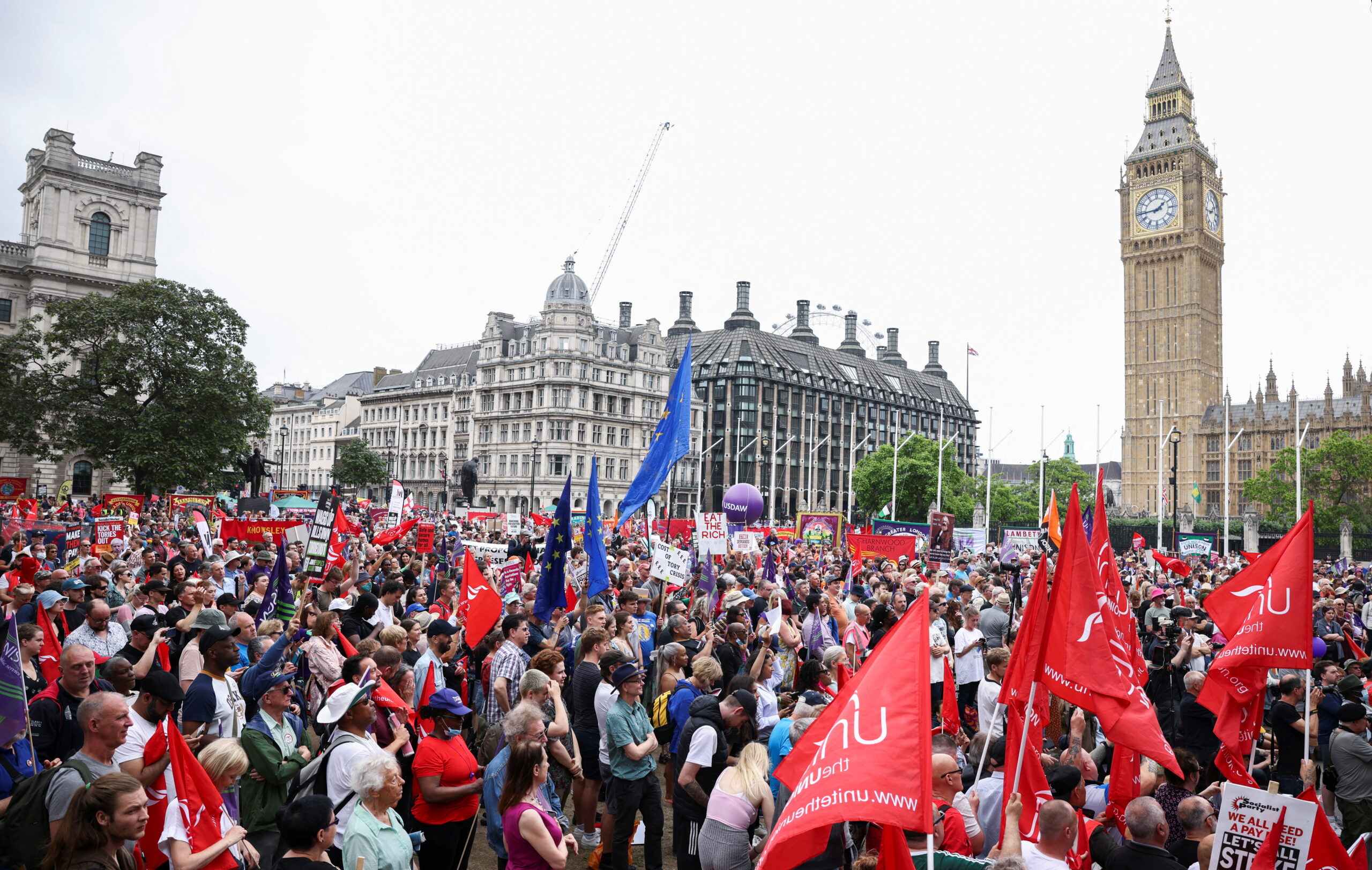Union Visibility is Up, But Membership is Still Low. Why?
Just a quarter of UK employees are union members.
by Tom Williams
16 July 2022

At its peak in 1979, the UK trade union movement boasted 13.2 million members. In 1980, 328,00 people were shop stewards – aka ‘reps’ or ‘workplace organisers’. Now, only 6.4 million people in Britain are members of a union. While membership rose between 2016 and 2020 – the first increase in a generation – 2021 saw growth stall as a result of job losses in the public sector. Just 23.1% of employees in the UK are now members of a union.
Why, given that workers have long been at the sharp end of stagnant wages, deregulation and the rise of precarious employment, is the union movement still so… small?
The answer would take a book (or two) to unpack. But ahead of what looks to be the biggest summer of industrial action for decades, understanding some of the most glaring issues facing the trade union movement has never felt more urgent.
Toothless unions.
When I started working for a trade union in 2018, my employers told me that the single biggest reason people weren’t in unions was that they’d never been asked to join one. I’m not convinced. The truth is that union power has been curtailed by decades of legislation from hostile governments.
The 1980s and 1990s saw defeat after defeat for the union movement. First, Margaret Thatcher crushed the miners. Then, in 1992, John Major’s government implemented the Trade Union and Labour Relations Act, consolidating legislation that curtailed workers’ rights to organise, collectively bargain and strike, such that going on strike without jumping through a series of legal hoops is now illegal. As labour law expert John Hendy once said: “Without the right to strike, collective bargaining is merely collective begging”.
In response, many unions adopted what are known as ‘service models’, moving away from strategies based around mass collective action towards offering individual members advice, expertise in employment law, and representation in disciplinary and grievance procedures. Consequently, unions now act like cheap law firms.
So while unions are – or should be – vehicles through which to secure better pay and conditions, the shift towards this more defensive posture meant there were no longer adequate reasons to be in them. “If a union isn’t helping to lift wages higher than their subs, it almost makes economic sense to cancel your direct debit,” says Hazel Nolan, GMB Regional Secretary for the North of England. “The reason unions fail in places to lift wages is that we’re still trying to shake off the service model.”
“The movement needs to have an honest look at itself,” she continues. “‘Organising’ and ‘campaigning’ are becoming meaningless, generic terms for any form of activity. It’s like we adopted the language, but not the approach.”
Casualised work.
Falling union memberships have also been linked to the rise of casualised work. One in six adults in the UK currently work in the ‘gig economy’, meaning they are hired as contractors on a per-job basis, as opposed to being employees (with the rights and benefits that being an employee entails).
The received wisdom in most union bureaucracies is that these workers are impossible to organise, because they are transient, don’t have a physical workplace in the classical sense, like a factory or a coal mine, and therefore don’t form relationships with other workers as they would on an assembly line or down a pit. As things stand, workers in these sectors are therefore often left to fend for themselves.
Yet research shows that when workers believe their union will fight, they will resist. Indeed, the movement can’t afford to write off ‘green sites’ (workplaces that are not traditional hotbeds of union activity, as opposed to the historically unionised ‘brown sites’). It takes time and work to activate casualised workers, but it is being done. The Communications Workers Union (CWU), for example, recently managed to ballot 9,000 call centre workers across the BT Group – and they voted overwhelmingly for strike action. These employees were described by CWU general secretary Dave Ward as “some of the most casualised and isolated workforces in this country” who are “notoriously difficult to organise”.
Where are all the reps?
Another related problem is the lack of experienced union organisers and reps, without which employers are more able to take liberties with their workforces. “[Because] many members view unions as services […] I have a workplace with 100 angry members but no one willing to be a rep,” explains one senior officer at Unite the Union who wished to remain anonymous.
There are also other barriers to people choosing to become reps. There’s a perception, for instance, that becoming a rep means being targeted by your employer as a ‘troublemaker’ – a fear heightened if you’re in precarious work (which is more likely if you belong to an ethnic minority). What’s more, structural barriers to union involvement also have a knock-on effect on both the size and diversity of the pool from which workplace organisers can be drawn. As a single parent, I’m often excluded from meetings due to childcare commitments. Statistically, these responsibilities are much more likely to fall on women, meaning not only is the pool smaller than it should be, but isn’t at all representative of the country’s workforce.
Unions could be doing things to tackle structural barriers to engagement; however, often they choose not to. Anecdotally, I know one union reverted to in-person training for reps as soon as Covid-19 restrictions were relaxed, despite internal evidence showing that courses being forced online had facilitated more women taking part (something reflected in online learning too).
If people from marginalised groups don’t feel unions will protect or advance their interests, they’ll be less likely to join. And if unions – and their representatives – don’t reflect those they’re supposed to represent, they won’t be able to win disputes.
What now?
When socialists began to flood out of the Labour party after 2019, many planned to focus their organising energy on their trade unions, apparently unaware that there are just as many right wingers and – let’s be honest – scabs in most unions as there are in the Labour party.
This isn’t a reason to avoid them, though. Unions are just another site of struggle, and factional organising in unions is necessary. Cohered left organising across the union movement is vital, from both more aggressive ‘base’ unions – like United Voices of the World (UVW) and the International Workers of Great Britain (IWGB), led more directly by members – to better resourced TUC-affiliated unions, led by people who are essentially professional trade unionists, often on salaries that dwarf those of the average member. Indeed, while we sometimes make the mistake of dismissing certain unions as ‘moderate’ or even ‘rightwing’, this ignores the fact that they are democratic membership organisations. Workers can ally with comrades in their own unions and others in order to build power and push union leaderships to change course. In this regard, Momentum’s new Trade Union Network, which aims to coordinate leftwing members in unions, is a welcome innovation.
Thatcher once said: “Economics are the method; the object is to change the heart and soul.” Tragically, she succeeded. We are all neoliberals now, to some extent – and this is surely part of why more people aren’t in unions. But this can change. Two years ago, in response to the Covid-19 pandemic, thousands of people formed mutual aid groups, demonstrating our capacity for cooperation, collaboration and collective action. If, amidst the ongoing economic crisis, unions can prove themselves once more to be useful tools of class struggle, then membership levels will surely rise. Indeed, it may soon be now or never.
Tom Williams is a socialist writer, educator and organiser.


